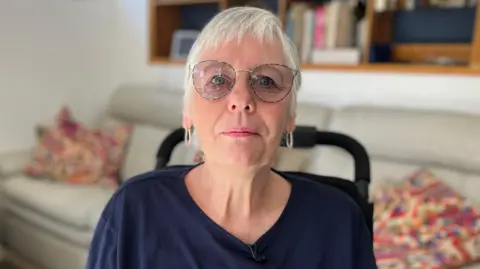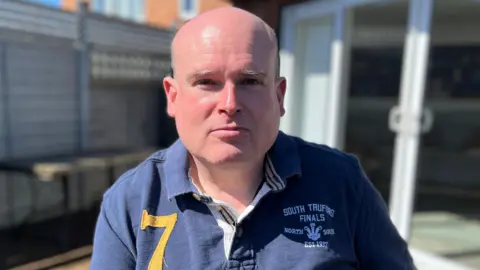We disagree on assisted dying bill - MND patients
 BBC
BBCAs the assisted dying bill is due to return to the House of Commons next month, the BBC spoke to two terminally ill people in Leicestershire who hold polar opposite views on the issue.
Last November, MPs backed the landmark bill to give terminally ill adults the right to end their life legally in England and Wales, subject to safeguards - MPs have a final chance to debate the bill at its third reading on 16 May.
Elaine Stonehouse, 68, who has Motor Neurone Disease (MND), backs the bill and said "choosing to die takes back control".
However, David Needham, 54, who also has MND, said he hoped the bill is ultimately "thrown out" as he is concerned any safeguards will not protect vulnerable people.
'Take back control'
The BBC brought Mrs Stonehouse, from Loughborough, and Mr Needham, from Goadby, together to discuss their opposing views on the bill.
Mrs Stonehouse said she strongly agreed with the 330 MPs supporting the change in the law to legalise assisted dying, compared to 275 rejecting it.
"It should go through immediately," she said.
"I don't want MND to define me. Choosing to die takes back control.
"I don't understand people that don't want it. It's a freedom of choice."
Mrs Stonehouse said it had been an incredibility difficult journey living with the "cruel disease" and resents her husband having to be her full-time carer.
"I hate it. I am not the person he married. It's not fair on me. It's not fair on my husband.
"It's not fair on the people around me to have to lift my cup, put a straw in, chop my food, take me to the toilet, dress me. That's no life."
She said the condition had affected her mobility, speech, swallowing and leaves her struggling to complete simple tasks.

However Mr Needham, who also has MND, said he disagreed with Mrs Stonehouse's views, and hopes the "bill gets thrown out".
The former sportsman said his journey before and after his "drawn out diagnosis" at the age of 43, was a struggle and losing autonomy was "a huge hit".
Despite this, he said life was precious and he had to work to find "new ways to take pleasure out of everyday activities".
"You have the choice to make your own path," he said.
"My wife, the family, the pets - there's a lot that I view as positive."
Mr Needham said he was also worried that safeguards around end of life decisions may not be sufficient.
"My issue is purely with the fact that, irrelevant of the safeguards that are allegedly being put into place, I don't think they're anywhere near sufficient to protect the more vulnerable people in society."
More than 5,000 people in the UK live with MND, which affects the brain and spinal cord, leading to progressive muscle weakness.
If the assisted dying bill passes into law, it could take up to four years to be fully implemented - double the timescale originally envisaged - to allow more time to set up training and systems for what would be an entirely new service.
Follow BBC Leicester on Facebook, on X, or on Instagram. Send your story ideas to [email protected] or via WhatsApp on 0808 100 2210.
